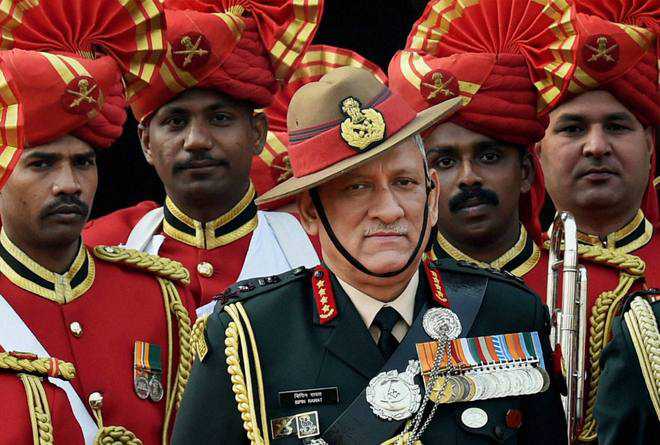Says fully conscious of responsibility, no change in vision and thrust areas

Army Chief General Bipin Rawat after guard of honour at South Block in New Delhi on Sunday. PTI
Ajay Banerjee
Tribune News Service
New Delhi, January 1
Army Chief General Bipin Rawat, who has planned and executed two cross-border surgical strikes, today sent out a strong message, saying India wanted peace and tranquility at its borders, but would not hesitate from using its power in any form.General Rawat was addressing the media after inspecting his first ceremonial guard of honour at the South Block in New Delhi. He had taken over as the Chief on Saturday.(Follow The Tribune on Facebook; and Twitter @thetribunechd)He said: “We want peace and tranquility at our borders but the target for peace does not mean we are weak. If need be, we will not hesitate to use force.”General Rawat is former Army Vice Chief. He closely monitored the cross-Line of Control (LoC) surgical strikes on September 29 to target militants’ launch pads in Pakistan-occupied Kashmir (PoK). In June 2015, General Rawat was heading the Dimapur (Nagaland) headquartered 3 Crops, when the Army destroyed militant camps of the NSCN (k) in Myanmar.India shares 3,323 km border with Pakistan, including a 749 km Line of Control (LoC). The Armies on either side are eyeball to eyeball. Indian Army lost 63 soldiers in Jammu & Kashmir in 2016. There have been 225 violations of ceasefire by Pakistan across the LoC.On the priorities, he said: “There will be no change in the vision and thrust areas of Army. It has been arrived at after due deliberations.”Earlier in the day, General Rawat said: “I am aware of the roles and tasks assigned to the Army. This will include maintaining security at the borders.”On two of his seniors — Lt Gen Praveen Bakshi and Lt Gen PM Hariz — being superseded, General Rawat said: “It’s the decision of the government. I respect the superseded officers. I hope we continue to work shoulder to shoulder in future to strengthen the unity and strength of the Army.”General Rawat also sent across a message to all ranks of the Army saying every soldier of the Army counts. “Everyone counts and is equal in my eyes,” he said in a possible effort to put a lid on the social media comments talking about promotion of Infantry officers over those from the armoured corps or the Artillery.
ARMY WILL USE POWER IF NEEDED: RAWAT
NEW DELHI: General Bipin Rawat on Sunday said the Indian Army’s role was to ensure peace along the borders but it would not hesitate to use force if needed.
Rawat took over as the army’s 27th chief a day earlier. The government overlooked claims of his two seniors to handpick him for the job. His vast operational experience in Jammu and Kashmir and the Northeast tilted the scaled in his favour.
“We want peace and tranquility, but that doesn’t mean we are weak. The army will not step back or hesitate to use force if necessary,” Rawat said after inspecting a customary guard of honour at South Block.
He will serve as the army chief for the maximum threeyear term, giving him enough time to implement his vision for the 1.3-million strong force
Son of a lieutenant general, Rawat has a reputation for being a no-nonsense commander who brings considerable military acumen to the table.
He was closely involved in planning surgical strikes on militant launchpads in Pakistanoccupied Kashmir in September and in Myanmar in June 2015.
As the commander of Indian peacekeeping troops in Congo in 2008-09, he reworked the UN contingent’s velvet-glove strategy to an iron fist within a month of his arrival.
Rawat allowed the use of helicopters to attack positions held by rebel groups responsible for civilian deaths, recruiting child soldiers and displacing millions of people. His tenure also saw infantry combat vehicles rigged with machine guns and cannons being used against rebels.
The government abandoned the seniority principle and ignored lieutenant generals Praveen Bakshi and PM Hariz to appoint Rawat as the army chief, triggering a controversy.
He had worked with both officers, had respect for them and everyone would cooperate to strengthen the army, Rawat said.
Bakshi pledged support to the new army chief on Saturday, ending speculation that he might opt to resign rather than serve under a junior officer.
In an interview to HT on Friday, Rawat, who has had three stints in Kashmir, said the situation in the Valley was dynamic and a status quo mentality wouldn’t work.
“You have to seek status change… A renewed thrust will be given to all issues in Kashmir,” he said.

